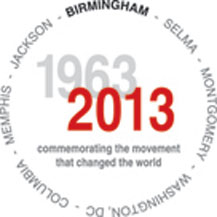How Women Were Silenced at 1963 March on Washington

Civil Rights Pioneer Gloria Richardson, 91, on How Women Were Silenced at 1963 March on Washington
 Fifty years ago this week, Martin Luther King Jr., John Lewis, A Philip Randolph, Bayard Rustin and other civil rights leaders spoke at the March on Washington for Jobs and Freedom. But where were the female civil rights activists? At the historic march, only one woman spoke for just more than a minute: Daisy Bates of the NAACP. Today we are joined by civil rights pioneer Gloria Richardson, the co-founder of the Cambridge Nonviolent Action Committee in Maryland, which fought to desegregate public institutions like schools and hospitals. While Richardson was on the program for the March on Washington, when she stood to speak she only had a chance to say hello before the microphone was seized. Richardson is the subject of a pending biography by Joseph R. Fitzgerald, “The Struggle is Eternal: Gloria Richardson and Black Liberation.” Richardson, 91, joins us to discuss the 1963 March on Washington and the censorship of women speakers; the Cambridge Movement to desegregate Maryland; her friendship with Malcolm X; and her assessment of President Obama and the civil rights struggle today.
Fifty years ago this week, Martin Luther King Jr., John Lewis, A Philip Randolph, Bayard Rustin and other civil rights leaders spoke at the March on Washington for Jobs and Freedom. But where were the female civil rights activists? At the historic march, only one woman spoke for just more than a minute: Daisy Bates of the NAACP. Today we are joined by civil rights pioneer Gloria Richardson, the co-founder of the Cambridge Nonviolent Action Committee in Maryland, which fought to desegregate public institutions like schools and hospitals. While Richardson was on the program for the March on Washington, when she stood to speak she only had a chance to say hello before the microphone was seized. Richardson is the subject of a pending biography by Joseph R. Fitzgerald, “The Struggle is Eternal: Gloria Richardson and Black Liberation.” Richardson, 91, joins us to discuss the 1963 March on Washington and the censorship of women speakers; the Cambridge Movement to desegregate Maryland; her friendship with Malcolm X; and her assessment of President Obama and the civil rights struggle today.
TRANSCRIPT
This is a rush transcript. Copy may not be in its final form.
AMY GOODMAN: Today is the eve of the 50th anniversary of the 1963 March on Washington for Jobs and Freedom, which brought hundreds of thousands to the nation’s capital. It’s considered one of the most significant civil rights gatherings in history. Events marking the occasion are scheduled throughout the country Wednesday, including a speech by President Obama at the Lincoln Memorial, where Dr. King gave his now-famous “I Have a Dream” speech.
King was joined by the future congressman, John Lewis; union leader A. Philip Randolph; march organizer, Bayard Rustin; Roy Wilkins of the NAACP; and others on the stage. But where were the female speakers at the March on Washington? Included on the program to sing on August 28, 1963, were Mahalia Jackson and Marian Anderson, but the only woman scheduled to actually speak at the rally was Myrlie Evers, widow of assassinatedNAACP Field Secretary Medgar Evers. When she couldn’t make it, organizers reportedly asked Daisy Bates to speak in her place.
Bates was the former president of the Arkansas chapter of theNAACP and also a longtime board member of the national NAACP. In 1957, she helped to enforce the Supreme Court’s school desegregation rulings by working with a group of teenagers later known as the Little Rock Nine. She helped recruit the nine black teenagers and escorted them through irate mobs of white adults and into their first classes at Little Rock Central High School, a previously all-white institution. As a result, Bates and her husband Lucious lost their business. She was jailed, threatened, and the Klu Klux Klan burned an eight-foot cross on her lawn. This is her entire speech on August 28, 1963, 50 years ago Wednesday.
DAISY BATES: Mr. Randolph, friends, the women of this country, Mr. Randolph, pledge to you, to Martin Luther King, Roy Wilkins and all of you fighting for civil liberties, that we will join hands with you as women of this country. Rosa Gragg, vice president; Dorothy Height, the National Council of Negro Women; the Delta Sigma Theta Sorority; the Methodist Church women—all the women—pledge that we will join hands with you. We will kneel-in, we will sit-in, until we can eat in any corner in the United States. We will walk until we are free, until we can walk to any school and take our children to any school in the United States. And we will sit-in, and we will kneel-in, and we will lie-in, if necessary, until every Negro in America can vote. This we pledge you, the women of America.
AMY GOODMAN: That was Daisy Bates of the NAACP speaking at the 1963 March on Washington for Jobs and Freedom. She spoke for just over a minute.
While many women played a key role in organizing the march and the civil rights struggle, in general, they went largely unrepresented at the march. At first there were no women included in the day’s lineup of speakers. Then Bates was added as part of a tribute to Negro women fighters for freedom. She is listed on the day’s official program, along with Diane Nash, Mrs. Medgar Evers and Mrs. Herbert Lee, both wives of slain civil rights organizers, as well as Rosa Parks and Gloria Richardson.
http://www.democracynow.org/2013/8/27/civil_rights_pioneer_gloria_richardson_91

